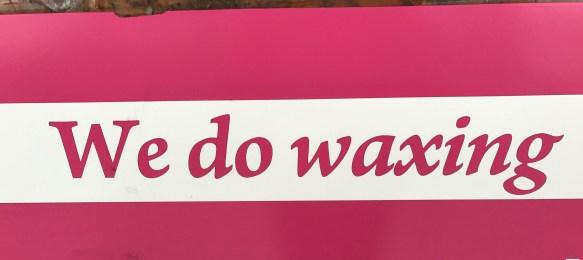Although I write about language, I’m not a total tourist in Math Land. That’s why these signs caught my eye, and not in a good way — more in tune with Margaret Atwood’s lines: “you fit Into me / like a hook into an eye / a fish hook / an open eye.” Okay, maybe not so extreme, but the signs are still problematic.
This poster offers a great deal:

Two-for-one tickets: not a problem. A week running from “Feb 12 to 25”: problem! Well, a problem for the performers if they’re being paid by the week and not per performance. A boon for ticket-buyers, who have 14 days to take advantage of this deal.
If theater’s not for you, try this gym:

Kudos to whoever realized that the compound adjective “one-hour” needs a hyphen. No kudos (anti-kudos?) for the person who decided to offer “3 classes & gloves.” Maybe the gym is aiming for the alien market, with three-armed boxers? Or for anxious fighters who take comfort in the idea that a spare glove is available?
This one mixes grammar with math:

The terrible layout made me ponder what “40 0ver Toppings” could be. Once I had decoded the meaning, I still winced at “over.” Traditionally, “more than” is proper for things you count and “over” for things you measure. I thought about writing “more than 40 toppings” on duct tape and attaching it to the sign, but I have more fun mocking mistakes than correcting them. Plus, I don’t want to go to jail.
This last one lacks a number:

I won’t quibble about “thru,” because, well, if I quibbled about spelling mistakes I’d be busy all day, every day. But “close”? This store is open from “4 pm” (where did the periods go?) until “close”? Isn’t everything open until “close,” or rather, until “closing”? To paraphrase all the teenagers I’ve ever met, “duh.” Add the appropriate, tell-me-something-I-don’t-know intonation and an eloquent eye-roll for the full effect.
That’s it for today. I was open to solving math problems, but now I close.
















 Unanswered Question: What happened to the candlestick maker?
Unanswered Question: What happened to the candlestick maker?






 Do you call the front desk for “boom service,” and if so, how much do you tip the guy who lowers the boom? How do you delivery a “jobsite”? And what does a “boom service” showroom show?
Do you call the front desk for “boom service,” and if so, how much do you tip the guy who lowers the boom? How do you delivery a “jobsite”? And what does a “boom service” showroom show?





